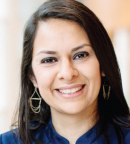When Narjust Duma, MD, Assistant Professor of Medicine and a thoracic oncologist at the University of Wisconsin Carbone Cancer Center in Madison, presented the findings from her study, “Evaluating Unconscious Bias During Speaker Introductions at an International Oncology Conference,” during the 2019 ASCO Annual Meeting,1 she did not expect the information to elicit negative online responses. The study analyzed how the selective use of forms of address during speakers’ introductions at the ASCO Annual Meeting may inadvertently strengthen gender bias.

Narjust Duma, MD
Dr. Duma and colleagues found that when introduced by men, female speakers were less likely to receive a professional address and were more likely to be introduced by their first name compared with male speakers. These findings have resulted in the development of The Language of Respect guidance from ASCO,2 which requires session moderators and presenters at the Annual Meeting and at other ASCO symposia to introduce all speakers with a doctoral degree as Dr. and their full name2 (see “Using Respectful Language to Reduce Unconscious Bias in Oncology Care,” on page 54).
The data from Dr. Duma’s study had been tweeted out the day before her presentation by Tatiana M. Prowell, MD, Chair of ASCO’s 2020 Annual Meeting Cancer Education Committee, a coauthor of The Language of Respect document, and Associate Professor of Oncology at Johns Hopkins School of Medicine and Breast Cancer Scientific Liaison in the U.S. Food and Drug Administration’s Office of Oncologic Diseases, with the goal of increasing attendance at the presentation. Although Dr. Prowell’s tweet initially generated support for the study, the feedback on Twitter quickly turned dark, with comments such as “Enough with political correctness,” and “Is it a good idea to encourage documentation of gender inequality?” Some even compared Dr. Duma’s results to the antivaccination movement. The response was so disturbing to Dr. Duma, it threatened to wipe away the excitement she felt at making her first-ever oral presentation at a scientific meeting.
“It was very disappointing to see many of my colleagues writing that I should just do lung cancer research and ‘not stir the pot,’” said Dr. Duma. “At the time, I was still a fellow, and the negative response to the study was overwhelming, because I didn’t want to divide the ASCO community. The study results are not meant to pit one group against another. At the end of this presentation, I asked everyone to work together to end gender discrepancy, because gender equity is not only a woman’s fight.”
Treating Everyone With Dignity
ASCO’s swift development of The Language of Respect guidance (see page 56) has helped mitigate some of the negative comments Dr. Duma and her study received and has given her validation that research in gender inequality is important.
“I don’t want to police people,” said Dr. Duma, “but it is important to expose this type of unconscious bias because when women are introduced by their first name, it sends the message that we don’t belong, which is not the intention of most people. To the privileged, equality feels like oppression, so the people who don’t encounter these challenges feel like the people advocating for equality are trying to oppress the rest. However, the whole point is that we are all physicians. How many more dues do we have to pay before we reach equality?”
Ending Unconscious Bias
The findings from Dr. Duma’s study and the development of ASCO’s The Language of Respect guidance are already having a profound effect on the medical community. Other organizations (including the American Society of Hematology and the American College of Physicians) are making plans to adapt ASCO’s The Language of Respect guideline for their members.
Dr. Duma is planning to conduct a follow-up study to measure how well requirements for speaker introductions outlined in The Language of Respect document were adhered to during sessions at the 2020 and 2021 Annual Meetings and whether they made a difference in reducing disparities in how female and male speakers were introduced. “I just want all of us to be treated equally,” commented Dr. Duma.
DISCLOSURE: Drs. Duma and Prowell reported no conflicts of interest.
REFERENCES
1. Duma N, Durani U, Woods CB, et al: Evaluating unconscious bias: Speaker introductions at an international oncology conference. J Clin Oncol 37:3538-3545, 2019.
2. ASCO Annual Meeting. Faculty instructions: Demonstrating respect for colleagues and the language of respect. Available at https://meetings.asco.org/am/faculty-instructions. Accessed March 19, 2020.

